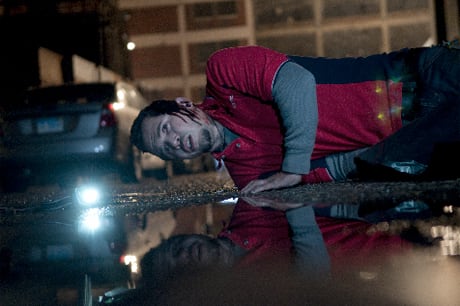Are you afraid of the dark? If not, there's little else to jolt your fear centre in Vanishing on 7th Street. In an unnamed city, a headlamp-strapped projectionist is doing his job when the power goes out. A back-up generator kicks in and everyone else is gone; only their clothes and personal effects remain. While he's freaking out trying to find other survivors, we're introduced to Luke (Hayden Christensen, Jumper). He's just woken up in bed, having left two candles burning all night. Tension builds via his gradual discovery of piles of clothes, cellphones and dentures, with no people attached.
As a set up, the premise is mysterious and foreboding, like a Stephen King short story, but as the film unfolds, it lacks a sense of gravity. Post-intro, Vanishing zips ahead 72 hours. Now, our characters know a little something about what's going on and Luke is established as nominal protagonist. Everyone left is packing a flashlight or some other means of producing light, while anyone whose light source fails for too long is devoured by darkness, literally.
The shadows look to be alive, growing, swelling and creeping as lights dwindle, then shrinking back from renewed illumination. There's potential, but the characters never develop into people worth caring about. Christensen is better than usual, and he's not an entirely typical hero, nor does his arc go exactly where expected. But he still acts with a distance that cracks the overall suspension of disbelief necessary to be immersed in this film's world. Likewise, Thandie Newton (W., 2012), as an irrational, bereaved mother, and the projectionist played by John Leguizamo are just oddly off.
Vanishing asks many questions and only really ventures answers at the issues of movie logic and jabs at the concept of what's knowable. Central topics of faith and the part willpower plays in existence are only quietly broached.
Director Brad Anderson (The Machinist) creates a strong Twilight Zone tone, but the pieces don't entirely gel. In the end, it's not the dark that's scary, but that some projects from talented people will inexplicably miss their mark.
(Mandalay Vision)As a set up, the premise is mysterious and foreboding, like a Stephen King short story, but as the film unfolds, it lacks a sense of gravity. Post-intro, Vanishing zips ahead 72 hours. Now, our characters know a little something about what's going on and Luke is established as nominal protagonist. Everyone left is packing a flashlight or some other means of producing light, while anyone whose light source fails for too long is devoured by darkness, literally.
The shadows look to be alive, growing, swelling and creeping as lights dwindle, then shrinking back from renewed illumination. There's potential, but the characters never develop into people worth caring about. Christensen is better than usual, and he's not an entirely typical hero, nor does his arc go exactly where expected. But he still acts with a distance that cracks the overall suspension of disbelief necessary to be immersed in this film's world. Likewise, Thandie Newton (W., 2012), as an irrational, bereaved mother, and the projectionist played by John Leguizamo are just oddly off.
Vanishing asks many questions and only really ventures answers at the issues of movie logic and jabs at the concept of what's knowable. Central topics of faith and the part willpower plays in existence are only quietly broached.
Director Brad Anderson (The Machinist) creates a strong Twilight Zone tone, but the pieces don't entirely gel. In the end, it's not the dark that's scary, but that some projects from talented people will inexplicably miss their mark.
